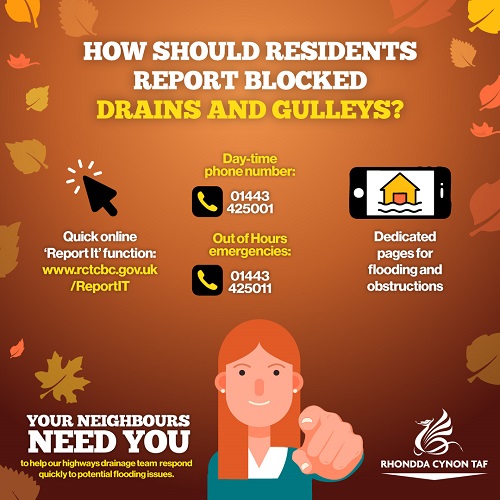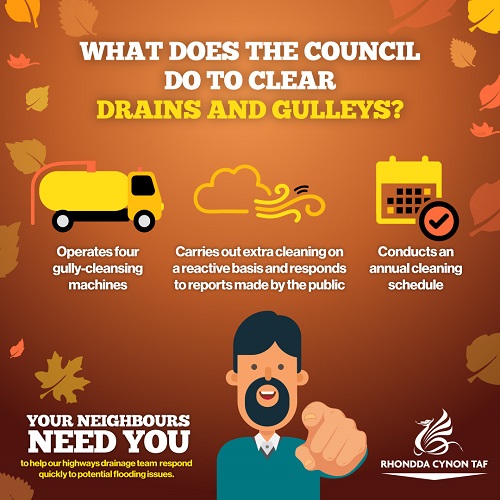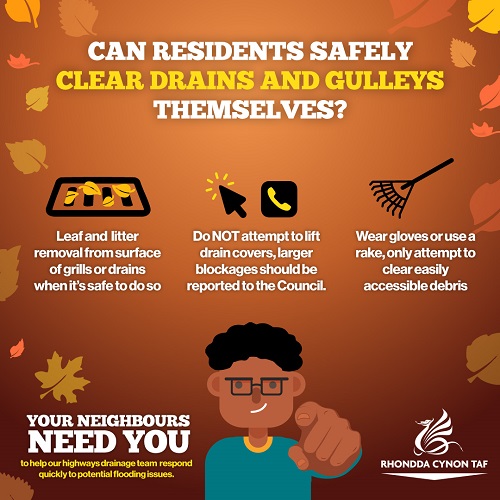No one can predict the weather, but we’re asking for your help by reporting any blocked drains and culverts you notice while out and about. Reporting these can be completed quickly online and allows our crews to react to your concerns.
Residents can also help our crews, if they are able to, by keeping any drains outside their homes clear of leaves and litter if it is safe and easy to do so.
It is so important that drains and gulleys in our communities are kept clear - as debris like leaves, branches, mud, and litter all risk blocking the drainage on our roads and streets. With heavy rainfall common at this time of year, debris can contribute to flooding local roads, rights of ways and properties.
How can residents report blockages to the Council?

It’s really helpful to report blocked drains, gulleys and culverts early. This helps us respond quickly and address potential flooding or drainage issues. It is particularly important in bad weather, or when storms are forecast.
Residents are encouraged to report any issues through a quick online process, via the dedicated ‘Report It’ webpage on the Council’s website. Specifically, there are dedicated webpages where residents can report a flooded drain and gully, or an obstruction or spillage on the road or pavement.
Alternatively, residents are welcome to call the Council on 01443 425001 during the day-time, or on 01443 425011 for Out of Hours emergencies.
What does the Council do to clear drains?

The Council has four gully-cleansing machines, operated by our dedicated highway drainage team. All drains in Rhondda Cynon Taf are included in an annual cleaning schedule, with extra cleaning carried out on a reactive basis. This reactive activity is often done as a result of reports made by residents.
We also undertake work to clear larger culverts. In winter (October to March) inspections and cleaning take place on a fortnightly basis – while priority culverts are inspected weekly. These are also inspected when a Met Office weather warning is issued and monitored during the subsequent bad weather to detect damage and react to any blockages.
Can residents safely clear drains themselves?

Residents are able to help, by removing easily-accessible leaves or litter from the surface of grills or drains near their property or in their street – but this should only be done if it can be done safely.
A rake or broom can be used for small debris, but if using your hands then please wear gloves. Residents should stand back from the road to avoid traffic, and also be aware of other pedestrians. All leaves and other green debris that you remove can be placed into your Green Waste bag – and booked in for collection on the Council’s website, here.
Please don’t attempt to lift drain covers, put your hands into the drain, or try to unblock larger blockages. Please leave these and contact us to clear.
Councillor Andrew Morgan OBE, Leader of Rhondda Cynon Taf Council and Cabinet Member for Infrastructure and Investment, said: “We’re asking residents to help our highway drainage teams this winter by reporting blockages to us when they spot them – whether that’s in a small drain in their street, or in a larger culvert. Reporting these instances to us early is really important to reduce the risk of flooding in our communities, particularly when bad weather is forecast.
“There are also instances where residents can clear drains themselves, where leaves and litter that are easily accessible can be removed, and where it is safe to do so. There are thousands of drains and gulleys in communities right across the County Borough – and as it’s not possible for the Council to monitor each one at all times. Small actions from residents can make a significant difference to reduce the risk of local flooding.
“Our latest ’Your Neighbours Need You’ campaign aims to inform residents about what our maintenance routines look like, how residents can best report any issues to us, and how the public can help. Look out for our regular content on the Council’s social media accounts, as well as our website – particularly around the times that Met Office weather warnings have been issued.”
Posted on 20/11/2024